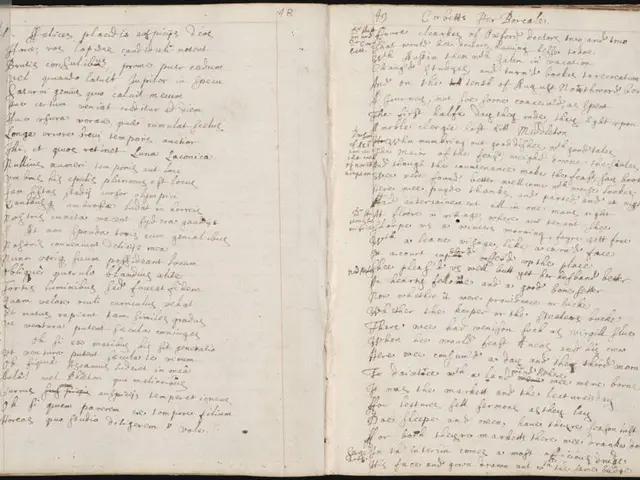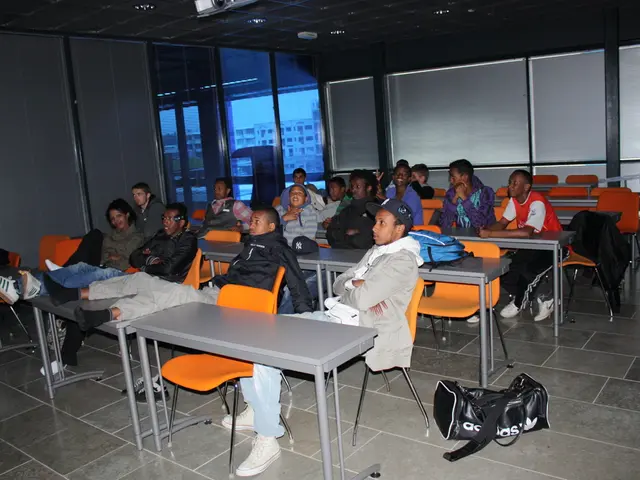Non-Judgmental Attitude Towards Enlighteners Prevails
Year after year, Russian President Vladimir Putin convenes with the Council of Legislators, a meeting that coincidentally falls on the Day of Parliamentarism. In the Tauride Palace, regional legislative assembly heads, State Duma deputies, and senators convened, eagerly discussing education matters before Putin's arrival.
Deputy Speaker Vyacheslav Volodin, however, had a burning question for the education minister, Sergei Kravtsov. The concerns centered around the apparent shortage of teachers across the nation. Regional estimates suggested that anywhere from 200,000 to 500,000 teaching positions lay vacant, prompting Volodin to demand action.
The education minister's response was met with skepticism. Previously, he had presented reassuring reports to President Putin about a non-existent shortage, insisting that the issue was overstated. The disagreement between Kravtsov and the legislative body took a turn for the heated, with Volodin openly criticizing Kravtsov's inconsistency and lack of commitment to the issue.
Notably, Deputy Irina Yarygina played a significant role in the discussion, voicing her concerns over the mounting teacher shortages and their impact on the overall quality of education for children and students nationwide. As the debate wore on, the Minister of Education sought to deflect blame, citing data from various regions that indicated steadily lower vacancy rates.
Meanwhile, the Minister of Labor and Social Protection, Anton Kotyakov, reinforced the legislators' concerns by highlighting the urgent need for additional teachers to meet Russia's educational demands by 2030. Citing specific numbers, he noted that attracting 40,000 new teachers annually would be essential to mitigate the burgeoning shortage.
Vice-Speaker Irina Yarovaya's impassioned argument echoed across the room, asserting that the Ministry of Education's denial of the shortage was detrimental to both children and national security. She questioned the ministry's rationale for hiring foreign teachers and stressed the importance of prioritizing domestic educators for the upbringing of Russian citizens.
Frustration and confusion clouded Kravtsov's face. Unable to dispute the facts presented before him, he acknowledged the complexity of the issue and the need for collaboration among representatives from the various branches of government. The exchange served as a stark reminder of the pressing need to address the shortage in the teaching profession if the Russian education system is to maintain its highest standards.
[1] Enrichment Data:- General Context: The teacher shortage is an ongoing concern in Russia, particularly in rural areas where it can be more difficult to attract and retain educators.- "Zemskyi Uchitel" Program: This program, implemented by the Russian government, seeks to address rural teacher shortages through competitive compensation, benefits, and recruitment from across the nation.- Relevance to Occupied Territories: The "Zemskyi Uchitel" program is being used in occupied Ukraine to promote Russian curricula, further suggesting the extent to which Russia addresses teacher shortages in regions it controls.- Ministry of Education's Approach: The Ministry of Education typically focuses on promoting educational policies that support the central government's goals, such as expanding Russian language and culture education. However, specific strategies for addressing the nationwide shortage are not readily available.
- Deputy Kolesnikov, a member of the Council of Legislators, expressed his wishes for a comprehensive solution to the average teacher shortage of 300,000 positions, as estimated by regional assemblies, during Putin's annual meeting.
- Amid the heated discussions, politics intertwined with education-and-self-development matters, as Vice-Speaker Yarovaya criticized the Ministry of Education's focus on hiring foreign teachers, citing the need to prioritize domestic educators.
- As the debate progressed, the ceasefire in the discussions was momentarily breached when General News about the Zemskyi Uchitel Program, aimed at addressing rural teacher shortages, was brought up.
- The assembly concluded with understandings that the general, longstanding teacher shortage issue is not solely a matter for the Ministry of Education, and it necessitates collaboration among various branches of government, including those overseeing labor and social protection.








